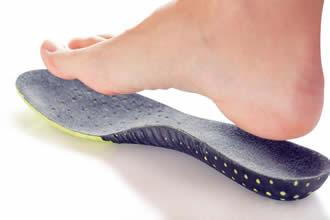Should I Get Custom Orthotics?

- posted: Dec. 03, 2021
Our feet are often overworked and underappreciated. They do so much for us and yet we often take them for granted unless they start to cause us issues. Whether you’re looking for ways to prevent foot problems from happening in the first place or you’re already dealing with these issues, there are many reasons people are turning to their podiatrist for custom orthotics.
What are orthotics?
Sometimes known as arch support, custom orthotics give people the freedom to stand and move easier and more comfortably. Some people might opt for over-the-counter orthotics because of convenience; however, over-the-counter orthotics are not crafted uniquely to your feet, which often means that they won’t provide the relief you’re looking for from foot pain and other issues, and may even make problems worse. Instead, consider getting custom orthotics that are designed to correct your specific foot problems, ease symptoms, and make it easier for you to get back to your life.
Here are the types of custom orthotics that podiatrists often provide:
Rigid Orthotics
Rigid orthotics are often made from harder materials such as plastic or carbon fiber and are used to control function. They also help to control motion in the joints of the foot. They are most often used with walking shoes or dress shoes as they help with strains, aches and pains in the legs, thighs, and lower back.
Soft Orthotics
Just like the name states, soft orthotics are made out of more cushioned materials so they can act as shock absorbers, help with balance, and relieve pressure. They also cradle the soles of the foot and support everything from the heel and balls of your feet to the toes. Since soft orthotics help to absorb shock, they can be a good option for athletes and those with active lifestyles.
Semi-Rigid Orthotics
Semi-rigid orthotics can also be a great option for sports players as they provide a good balance. As the name implies, semi-rigid orthotics are made with layers of soft material that are backed by a rigid material. While this type is great for avid walkers and the like, semi-rigid orthotics are also prescribed to treat flatfoot and other foot disorders in children. If you’re planning on running a marathon this year and you’re experiencing foot pain, semi-rigid orthotics might help relieve some of the discomforts you’re feeling while training.
Are you interested in custom orthotics? If so, your podiatrist can chat more about orthotics and how they could benefit your feet based on your foot health, age, activities, and lifestyle.

- posted: Dec. 03, 2021
Our feet are often overworked and underappreciated. They do so much for us and yet we often take them for granted unless they start to cause us issues. Whether you’re looking for ways to prevent foot problems from happening in the first place or you’re already dealing with these issues, there are many reasons people are turning to their podiatrist for custom orthotics.
What are orthotics?
Sometimes known as arch support, custom orthotics give people the freedom to stand and move easier and more comfortably. Some people might opt for over-the-counter orthotics because of convenience; however, over-the-counter orthotics are not crafted uniquely to your feet, which often means that they won’t provide the relief you’re looking for from foot pain and other issues, and may even make problems worse. Instead, consider getting custom orthotics that are designed to correct your specific foot problems, ease symptoms, and make it easier for you to get back to your life.
Here are the types of custom orthotics that podiatrists often provide:
Rigid Orthotics
Rigid orthotics are often made from harder materials such as plastic or carbon fiber and are used to control function. They also help to control motion in the joints of the foot. They are most often used with walking shoes or dress shoes as they help with strains, aches and pains in the legs, thighs, and lower back.
Soft Orthotics
Just like the name states, soft orthotics are made out of more cushioned materials so they can act as shock absorbers, help with balance, and relieve pressure. They also cradle the soles of the foot and support everything from the heel and balls of your feet to the toes. Since soft orthotics help to absorb shock, they can be a good option for athletes and those with active lifestyles.
Semi-Rigid Orthotics
Semi-rigid orthotics can also be a great option for sports players as they provide a good balance. As the name implies, semi-rigid orthotics are made with layers of soft material that are backed by a rigid material. While this type is great for avid walkers and the like, semi-rigid orthotics are also prescribed to treat flatfoot and other foot disorders in children. If you’re planning on running a marathon this year and you’re experiencing foot pain, semi-rigid orthotics might help relieve some of the discomforts you’re feeling while training.
Are you interested in custom orthotics? If so, your podiatrist can chat more about orthotics and how they could benefit your feet based on your foot health, age, activities, and lifestyle.
